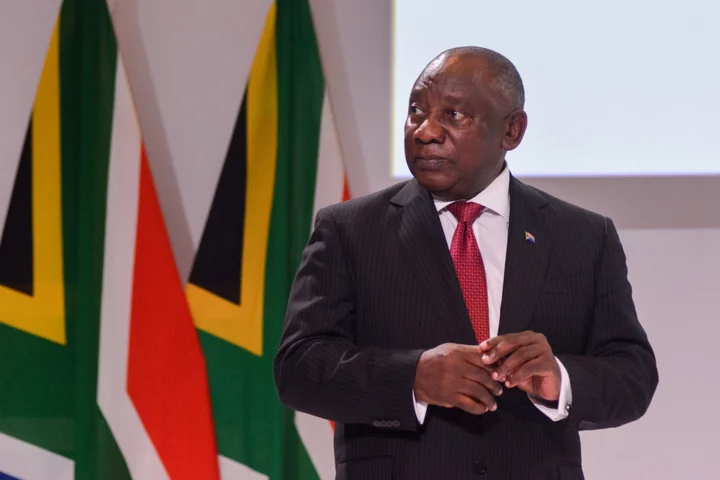
Ramaphosa Advisers Say South Africa Must Shun Coal, Use Minimal Gas
South Africa’s Presidential Climate Commission has advised the country, which relies on coal for most of its electricity,
2023-05-31 04:17
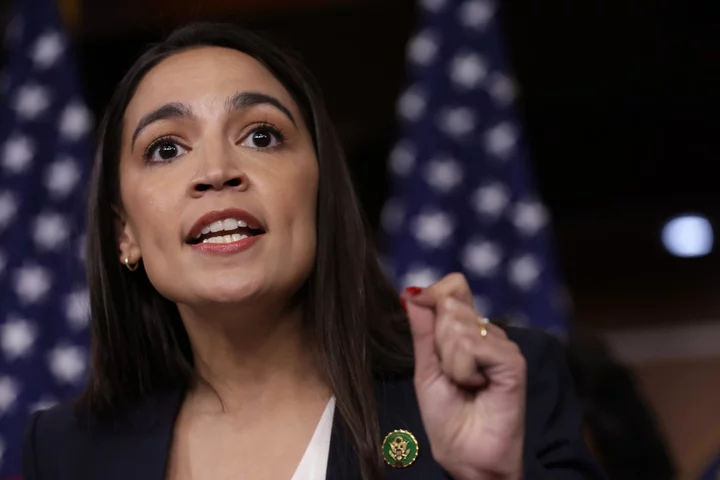
AOC threatens to leave Twitter after Elon Musk promotes ‘disgusting’ account impersonating her
Alexia Ocasio-Cortez has threatened to quit Twitter after Elon Musk promoted a “sick” account impersonating the star Democratic politician. The New York congresswoman said that she was “assessing” what to do after the billionaire interacted with the fake account on his social media platform. “FYI there’s a fake account on here impersonating me and going viral. The Twitter CEO has engaged it, boosting visibility,” Ms Ocasio-Cortez tweeted on Tuesday. “It is releasing false policy statements and gaining spread. I am assessing with my team how to move forward. In the meantime, be careful of what you see.”
2023-05-31 02:52

Climate Costs Mount for Poorer Nations Already Burdened by Debt
Pakistani Prime Minister Shehbaz Sharif warned world leaders at the COP27 climate talks last November that developing nations
2023-05-30 12:25
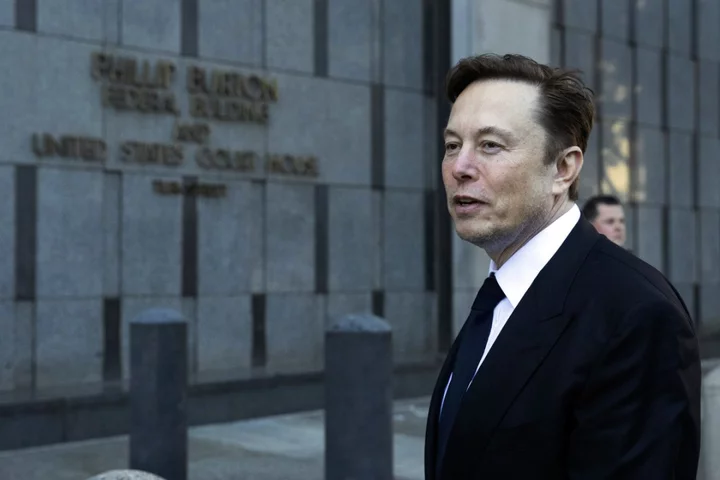
Elon Musk tweets quote by neo-Nazi wrongly attributed to Voltaire
Twitter users on Saturday were quick to point out that a quote shared by CEO Elon Musk had been misattributed to Voltaire – when it had in fact originated with a neo-Nazi. The billionaire tweeted a joke featuring a meme that showed a large hand crushing struggling figures with the accompanying words: “’To learn who rules over you, simply find out who you are not allowed to criticize.’ – Voltaire” Underneath that, the meme includes the joking comment: “we need to rise up against children with leukemia.” The very same “Voltaire” quote, however, was the subject of a fact-check piece last year from The Associated Press after Republican Kentucky Congressman Thomas Massie shared it in a tweet criticizing Dr Anthony Fauci, also attributing the words to the French philosopher. “Enlightenment-era writer Voltaire did not say this,” AP reported. “The quote, which was paraphrased, comes from a 1993 radio broadcast by Kevin Alfred Strom, who has been identified as a neo-Nazi by organizations that monitor hate groups.” The AP continued: “The original quote from Strom, a self-proclaimed American white nationalist and Holocaust denier, has been used previously online and paraphrased in a variety of ways ... Despite the quote originating more than a hundred years after Voltaire’s death in 1778, it has been repurposed and incorrectly attributed to him dozens of times. In 2019, actor John Cusack tweeted the quote before deleting the post and apologizing.” On Saturday, Musk’s tweet remained for hours without correction or apology as users pointed out the inaccuracy, some with glee and some with scorn. “If only your ability to launch rockets or presidential campaigns was as good as your ability to launch misinformation,” tweeted commentator and author Keith Olbermann. “Voltaire didn’t say that. A neo-Nazi said that. 30 years ago. Good work, Elmo.” Another user, @HistoryUser, shared a Reuters fact-check link and wrote: “This was not said by Voltaire but by Kevin Strom, a neo-Nazi and Holocaust denier. It’s a cool quote and I wish it had been said by a better dude, but it wasn’t, and so people should really stop using it. (And definitely stop saying Voltaire said it!)” The Independent has reached out to Twitter for comment. Read More Elon Musk's brain implant company Neuralink says it has US approval to begin trials in people EU official says Twitter abandons bloc's voluntary pact against disinformation DeSantis signed bill shielding SpaceX and other companies from liability day after Elon Musk 2024 launch Kimberly Guilfoyle threatens DeSantis: ‘You’re going to get hurt, and damaged – badly’ Donald Trump Jr shares doctored Office clip showing Ron DeSantis wearing a woman’s suit
2023-05-28 06:29

Brazil’s Amazon Region to Host UN Climate Summit in 2025
Belem, a city in Brazil’s Amazon rainforest region, will host the United Nations’ annual climate change summit in
2023-05-27 03:24

Florida mom who tried to ban Amanda Gorman’s book has ties to far-right groups
A Florida woman whose complaints led to school restrictions for a poem read at Joe Biden’s inauguration appears to have ties to several far-right groups, including the Ron DeSantis-supported Moms for Liberty and neo-fascist gang the Proud Boys. In a complaint requesting that her child’s school remove the books entirely, Daily Salinas claimed that The Hill We Climb – Amanda Gorman’s book-length version of the poem she read at the president’s inauguration ceremony – and several other titles contained references to critical race theory, gender ideology, “indirect hate messages,” and “indoctrination,” especially of socialism, according to documents shared by the Florida Freedom to Read Project. Her complaint prompted the school to restrict access to the book, along with The ABCs of Black History, Cuban Kids and Love to Langston. A school committee moved the books to the library’s middle school section, despite the books being recommended for younger readers. Ms Salinas told the Miami-Herald that she “is not for eliminating or censoring any books” but wants materials to be appropriate and for students “to know the truth” about Cuba. But she appears to have connections with or has expressed support for several far-right groups that have promoted sweeping restrictions against LGBT+ people and honest discussions of race and racism, according to a review of her social media history and online activity from Miami Against Fascism and The Daily Beast. In August 2021, she was photographed alongside Proud Boys leader Enrique Tarrio during a protest against Covid-19 protections in Miami-Dade schools. The following year, while wearing a Ron DeSantis T-shirt, she attended another rally organised by Proud Boys to support far-right activist Christoper Monzon, a 2017 “Unite the Right” rally attendee who was allegedly beaten while canvassing for Republican Senator Marco Rubio last year. Ms Salinas also was photographed posing with Mr Monzon and a small group of his supporters after his release from hospital. That same year, Ms Salinas also worked as a volunteer for the governor’s “Education Agenda Tour,” which promoted right-wing candidates in school board elections as part of his efforts to upend the state’s education system. Video from a Miami-Dade school board meeting in July 2022 appears to show Ms Salinas with the group Moms for Liberty disrupting the hearing to protest sex education textbooks that had previously been approved by the board. Footage shows police forcibly removing her from the meeting. Moms for Liberty, a right-wing group that emerged from protests over Covid-19 guidelines, has offered so-called bounties for reporting teachers who allegedly discuss “divisive topics” in schools, attacked The Trevor Project for supporting young LGBT+ people at risk of suicide, and launched a barrage of book challenges. The group has also won praise from Mr DeSantis, who appointed one of its members to a board that now controls properties operated by the Walt Disney Company for its massive Orlando park campus. The Independent has requested comment from the group’s Miami-Dade chapter. A review of Ms Salinas’ social media history includes a Facebook post calling the Proud Boys “los mejores”, or “the best.” “My Proud Boys,” she wrote in the post on April 2021, above a photo of Tarrio with other members of the group. In March of this year, she shared a Facebook post promoting the “Protocols of the Elders of Zion,” a fraudulent century-old piece of antisemitic propaganda. Ms Salinas appeared to have deleted the post after it was flagged by Miami Against Fascism on Twitter. She then posted an image of an Israeli Defense Force soldier with a caption reading: “People never seen this. I love my Jewish people.” “I want to apologize to the Jewish community,” she told the Jewish Telegraphic Agency on 24 May. “I’m not what the post says,” she added. “I love the Jewish community.” She also co-hosted a Spanish-language podcast – “Hablando Como Los Locos” – that published an episode with the caption “Learn more about Kanye West, his polemic, his message” on 5 December 2022. Four days earlier, the rapper appeared on Alex Jones’s InfoWars and praised Adolf Hitler. The Independent has requested comment from Ms Salinas. Mr DeSantis – who has entered the race for the 2024 Republican nomination for president – has ushered through sweeping laws to control public school education and lessons and speech he deems to be objectionable while characterising reporting on the impacts of such policies as a “hoax” and a “fake narrative” manufactured by the press. The state is at the centre of a nationwide trend of challenges against books and materials in libraries and schools, while the governor continues to falsely insist that no books have been banned as he launches his 2024 campaign. A trio of state laws enacted within the last school year include what opponents have called the “Don’t Say Gay” law, which prohibits classroom instruction on sexual orientation or gender identity in all school grades, and laws that restrict discussions of race or racism, and mandate how schools catalog books on their shelves. Taken together, teachers and schools have been forced to remove materials out of fear of facing legal action without clear guidance, or have faced an increase in threats and challenges from activists emboldened by legislation. Last week, Penguin Random House and several prominent authors and families filed a federal lawsuit against a school district where activists have challenged dozens of books, largely involving or written by people of colour or LGBT+ people. In Escambia County alone, nearly 200 books have been challenged, at least 10 books have been removed by the school board, five books were removed by district committees, and 139 books require parental permission, according to an analysis from free expression group PEN America. In Florida’s Clay County, at least 100 books were pulled off shelves after challenges from a single person, PEN America found. Read More Amanda Gorman ‘gutted’ after poem banned at Florida school The book ban surge gripping America’s schools and libraries The school librarian in the middle of Louisiana’s war on libraries
2023-05-26 05:15
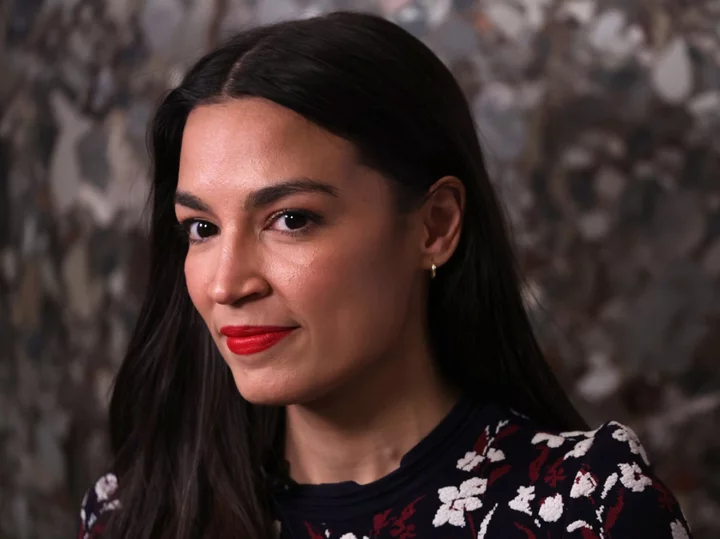
AOC jokes more people watched her gaming online than listened to glitch-ridden DeSantis launch
New York Democrat Alexandria Ocasio-Cortez mocked Florida Governor Ron DeSantis’s presidential campaign launch by noting that more people watched her gaming online than listened to the 44-year-old begin to make his case to the voters. Mr DeSantis started his campaign on Twitter Spaces alongside platform owner and Tesla CEO Elon Musk and entrepreneur David Sacks. The launch was marred by tech issues, with the live broadcast crashing several times and the sound dropping out, which Mr Musk blamed on the servers being overwhelmed by the number of people trying to listen in. Ben Collins of NBC News tweeted on Wednesday night that “David Sacks just ludicrously made up that Ron DeSantis’ Twitter space was the largest group that ‘has ever met online.’ There are 100,000 people in this thing.” “We had more people join when I played Among Us,” Ms Ocasio-Cortez added. More than 400,000 people watched Ms Ocasio-Cortez and Minnesota Democrat Ilhan Omar play the game Among Us on Twitch in the lead-up to the 2020 election – one of the 20 most watched streams on the platform at the time, according to The Verge. Ms Ocasio-Cortez was far from the only one mocking the debacle of Mr DeSantis’s disastrous launch. Donald Trump Jr echoed his father’s ‘”low energy” comments about former Florida Governor Jeb Bush during the 2016 campaign, saying that “DeSantis is making JEB! look high energy right now”. Memes began to be shared of the Twitter Spaces chaos, including an edited video of Mr Trump tackling Mr DeSantis to the ground. After the tech issues plaguing the Twitter Spaces event finally faded, Mr DeSantis was mocked for his voice. “Now that the space has worked long enough for DeSantis to deliver consecutive desentences, all I’m seeing are tweets about how annoying his voice is,” Bobby Lewis tweeted. DNC member Thomas Kennedy added: “Holy s*** this is the worst campaign launch I have objectively ever seen. Embarrassing technical difficulties and consists of DeSantis rambling with his annoying nasally voice about the most niche hyper online right-wing issues that your average voter finds weird and alienating.” Josh Marshall of Talking Points Memo, tweeted that “the initial space topped out at over 600k but this one is stuck at 139k”. The second space later hosted on the account of Mr Sacks reached more than 300,000 listeners, according to Twitter. “BuzzFeed exploding the watermelon hit 820,000 concurrent viewers in 2016,” Tom Gara noted. MSNBC host Chris Hayes said: “I’m sorry but this is an ASTOUNDINGLY HUMILIATING degree of incompetence. Unspinnable failure. Total and complete. Fully public.” Former Obama official and Pod Save America co-host Tommy Vietor tweeted on Wednesday evening that “doing a Twitter spaces conversation with Elon at some point during your campaign is a good idea, even if its glitchy. Making this awkward mess your presidential announcement is truly a disaster”. The right-wing account Catturd added: “I left the Space - It was so terrible and boring I couldn’t take it anymore. I’m going to go watch some paint dry so I can be more entertained.” Rep Matt Gaetz of Florida, a Trump supporter, simply wrote: “DeSedative.” Read More DeSantis wants to model America after Florida. Civil rights groups are sounding the alarm on his ‘hostile’ agenda DeSantis dismisses climate change, calling it ‘politicisation of weather’ Ron DeSantis news – live: DeSantis’ glitch-filled 2024 launch on Elon Musk’s Twitter Spaces branded ‘DeSaster’
2023-05-26 02:50
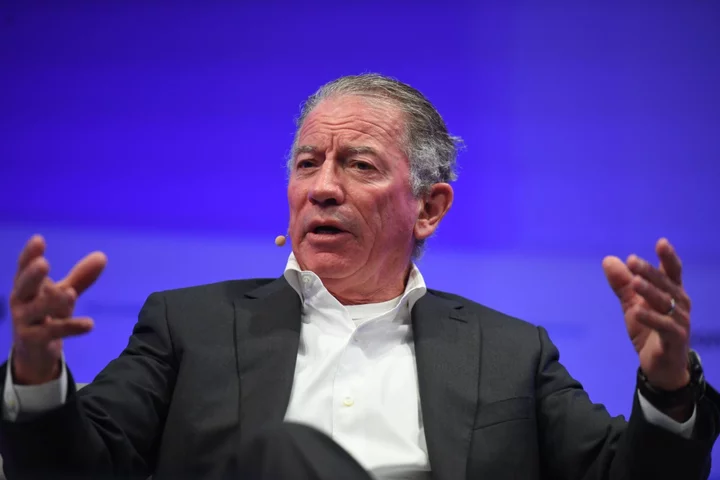
AI Darling Criticized for Product Delays, Founder Tom Siebel’s Micromanaging
The AI hype cycle has birthed innumerable boosters. An unlikely member of this group is Silicon Valley billionaire
2023-05-25 20:19
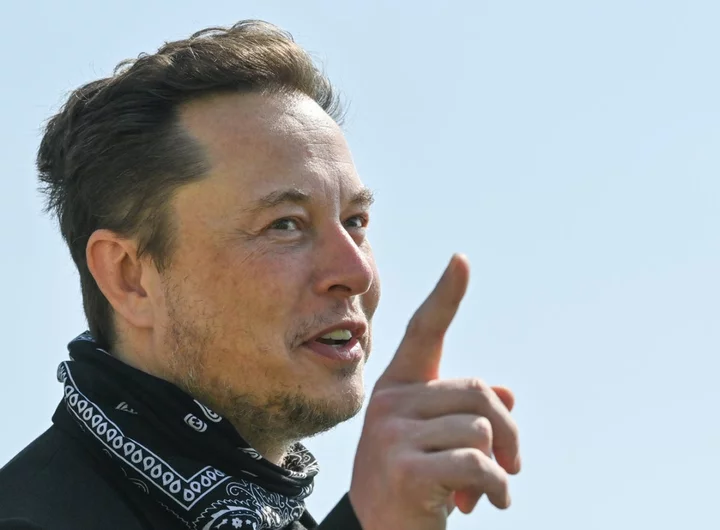
From self-proclaimed ‘socialist’ to Team Trump and DeSantis: Elon Musk’s curious politics revealed
“I prefer to stay out of politics." Those were Elon Musk’s words when forced in September 2021 to respond to a claim by Texas governor Greg Abbott that he supported the state’s anti-abortion laws. If he really does prefer to stay out of politics, however, Musk has a funny way of showing it. Over his many years of fame as the chief executive of Tesla, SpaceX, and now Twitter, the South African-born tycoon has attacked everyone and everything from Donald Trump and Bernie Sanders through individual regulatory officials to Covid rules, trade unions, and "pronouns". Since 2022, his public political stances have taken a sharp rightward turn as he declared his support for the Republican Party, aligned himself with far-right activists on Twitter, disparaged transgender rights, embraced conservative conspiracy theories, and pledged to save civilisation from the “woke mind virus”. His activities appear to have earned him the patronage of Florida’s GOP governor Ron DeSantis, who was announcing that he is running for president during a conversation with Musk in Twitter’s audio panel service Spaces on Wednesday 24 May. It is a striking departure from the 51-year-old’s aproach to politics before the Covid pandemic, when he carefully triangulated between left and right and donated to both Democrats and Republicans while variously declaring himself a “moderate”, a “socialist”, and “socially liberal and fiscally conservative”. Yet despite evidence to the contrary, Musk still claims to be an independent who is “neither conventionally right nor left” and committed to healthy debate. So what does Elon Musk really believe? And – given that he is both one of the world’s richest people and the owner of one of its largest social networks – what does that mean for the rest of us? Embracing the Republican Party Let’s start with Musk’s recent support for the US Republican Party, which has been clear and unambiguous, if not without caveats. “In the past I voted Democrat, because they were (mostly) the kindness party. But they have become the party of division and hate, so I can no longer support them and will vote Republican,” he said in May. This came after months of criticism of President Joe Biden, which included hammering his flagship infrastructure and social spending bills for granting subsidies to the electric car industry and increasing the “insane” federal budget deficit. Musk later called the president a “damp sock puppet in human form”. In June 2022, Musk went further, revealing he had voted for Republican congressional candidate Maya Flores in a special election – the first time, he claimed, that he had ever cast a vote for the GOP. “Massive red wave in 2022,” Musk tweeted, though it was unclear if he meant this as a prediction or a rallying cry. Florida governor Ron DeSantis joked about the South African-born billionaire’s comments: “I’m focused on 2022, but with Elon Musk, what I would say is I welcome support from African Americans. What can I say?” Despite all this, Musk has stopped short of declaring his permanent support for the party as a whole. Following his tweet about the special election, one Twitter user asked: “I assume Republican for president [too]?” “[To be determined],” Musk replied. “What are you leaning towards?” he was asked in a follow-up question. “DeSantis,” he said. Similarly, the mogul’s endorsement of the Republican Party on the day before the US midterms in November 2022 was somewhat qualified. “To independent-minded voters: Shared power curbs the worst excesses of both parties,” he told his his 115 million Twitter followers. “Therefore I recommend voting for a Republican Congress, given that the presidency is Democratic. Hardcore Democrats or Republicans never vote for the other side, so independent voters are the ones who actually decide who’s in charge!” After the election, Musk added: “To be clear, my historical party affiliation has been Independent, with an actual voting history of entirely Democrat until this year. And I’m open to the idea of voting Democrat again in the future.” A self-proclaimed ‘centrist’ who donates to both paties Musk’s caveats about supporting the GOP echo his longstanding claim to be a “centrist” or an “independent” who does not fit into traditional boxes of left or right. For years, he has offered varying definitions of his own politics. His most consistent theme has been that he is “socially liberal and fiscally conservative”, or even “socially very liberal”. In 2020, he put it this way: “I’m socially very liberal. And then economically right of center, maybe, or center. I don’t know. I’m obviously not a communist.” In 2018, he described himself as “a utopian anarchist of the kind best described by Iain Banks”, referring to the late Scottish sci-fi author who wrote longingly (if sceptically) of a space-faring anarcho-socialist civilisation called the Culture, which has no money, no poverty, no wage labour, no police, no prisons, no standing army, and nearly infinite abundance of basic goods. At another point Musk claimed to be a “socialist”, but “not the kind that shifts resources from most productive to least productive”. He later said we should not take what he’d said too seriously. In April 2021, he posted a stick figure cartoon on Twitter that depicted political moderates, including himself, standing still on the political spectrum while the left accelerates away into extremism, dragging the centre ground away and making moderates appear right-wing by comparison. The following November, he professed himself “neither conventionally right nor left”, and in December remarked: "You know Twitter is being fair when extremists on far right and far left are simultaneously upset!" Musk’s political donations offer some support for this. According to data gathered by the non-profit lobbying watchdog Open Secrets, Elon Musk has given a total of $1.2m to politicians, parties, political action committees (PACs), and referendum campaigns since 2002. That money went almost equally to Democrats, with $542,000, and Republicans, with $574,500, with another $85,000 going to two broadly left-wing referendum campaigns in California. The balance has fluctuated over the years: in 2006, 2013 and 2017 he donated overwhelmingly to Republicans, while in 2015 he gave exclusively to Democrats. He has also given a total of $30,000 to a PAC set up by SpaceX, which donated 54 per cent of its total to Democrats and 46 per cent to Republicans. Many of the individual politicians he gave to were state legislators in California, where Tesla was formerly based, and Texas, where SpaceX has long maintained rocket testing and launch facilities. Musk donated to more individual Democratic politicians than to Republicans, and often praised specific Democrats in a way he has rarely done with their opponents. Way back in 2005, he gave $10,000 to California’s Proposition 82, a proposal to increase taxes on the rich to pay for universal pre-school for four-year-olds, although it did not pass. When Donald Trump was a candidate for the Republican nomination, Musk said of him: “I feel a bit stronger that he is probably not the right guy. He doesn’t seem to have the sort of character that reflects well on the United States.” Musk says he voted for Joe Biden in 2020. Meanwhile, SpaceX itself has spent about $9.7m on lobbyists and Tesla has spent $5.5m. The former company relies on government contracts for much of its revenue, while the latter is subject to plenty of regulation. "SpaceX's campaign to win political support has been systematic and sophisticated," wrote the Sunlight Foundation in 2013. Musk has described these donations not as a signal of his own personal beliefs but simply as the cost of doing business in America. "In order to have your voice be heard in Washington, you have to make some little contribution," he told the Huffington Post in 2013. All of which helps explain why the first version of this article – back in December 2021 – framed Musk’s political beliefs as elusive and somewhat puzzling. Since then, however, Musk’s own behaviour has made that idea rather outdated. Elon Musk, culture warrior There’s no avoiding the obvious: Musk appears to have been thoroughly red-pilled. Originally drawn from the 1999 sci-fi film The Matrix, the “the red pill” is a phrase used by white supremacists and anti-feminists to describe the process of being radicalised into their worldview. Musk himself urged his Twitter followers to “take the red pill” in April 2020. It is a neat expression of how far down the culture war “rabbit hole” Musk has burrowed since then. He has described “wokeness” as a “mind virus” that poses a “mortal threat to civilisation”, declaring: “The woke mind virus is either defeated or nothing else matters.” In a June 2022 interview with The Babylon Bee, a conservative satire site, he said: "At its heart, wokeness is divisive, exclusionary and hateful. It basically gives mean people... a shield to be mean and cruel, armored in false virtue." In a similar vein, he mocked Twitter’s adoption in 2016 of “Stay Woke” T-shirts inspired by the 2014 Ferguson protests against police racism, claiming that the protesters’ “Hands up, don’t shoot” slogan was “made up” and that “the whole thing was a fiction”. The US Justice Department did indeed clear the officer who shot Michael Brown, but also concluded that Ferguson police had “routinely” violated citizens’ constitutional rights and discriminated against Black people. Texas governor Greg Abbott, to whom Musk donated $10,000 in 2014, has claimed that Musk “likes the social policies” of his state, which include banning almost all abortion and defining transgender healthcare for under-18s as “child abuse”. Musk rebuffed him, but ambiguously and mildly, with nothing like the fire and brimstone he has mustered against trade unions or tax proposals. Musk has also boosted right-wing conspiracy theories, claiming that health tsar Anthony Fauci should be prosecuted and sharing a groundless claim about the attack on Nancy Pelosi’s husband from a website with a history of fake news. As a homophobic hate campaign began to gather steam against one of his former employees, Yoel Roth, Musk weighed in to groundlessly imply that Roth was an enabler of child abuse. Roth subsequently suffered a torrent of abuse and threats that reportedly forced him to leave his home. That incident echoed the US right’s growing penchant for smearing political opponents, and particularly LGBT+ people, as paedophiles or “groomers”. According to the left-wing think tank Media Matters, some members of the quasi-fascist QAnon movement – which helped popularise child abuse smears as a political tactic – are convinced that Musk is one of them, albeit based on shaky evidence. On Twitter, Musk regularly interacts on friendly terms with far-right activists who traffic in hoax claims about the 2020 US election and hate speech about minority groups, sometimes soliciting their advice about how to run the site or chiming in to agree with their tweets. Perhaps this could be explained as a commitment to maintaining open discussion across political divides – except it’s hard to name any left-wingers with whom he is so pally. Musk has shown a particular antipathy to Covid lockdowns, which he once described as "fascist". He declared early in the pandemic that "the coronavirus panic is dumb" and wrongly predicted that the virus would be gone from America by the end of April 2020. He has also consistently singled out transgender people in his critiques of “wokeness”. While he has claimed to “absolutely support” trans people, he scorns the idea that anyone should be expected to use the correct pronouns when referring to them, which most trans people view as a basic act of respect that is necessary for their equal participation in society. “Forcing your pronouns upon others when they didn’t ask, and implicitly ostracising those who don’t, is neither good nor kind to anyone,” Musk said in December 2022. He has previously declared that “pronouns suck” and tweeted a meme likening cisgender people who state their pronouns on their Twitter profiles to oppressive Redcoats in colonial America. Before buying Twitter, he railed against the social network’s rules on anti-trans hate speech, which forbid users from intentionally referring to specific trans people by their birth sex (known as misgendering) or by old names they have renounced (known as deadnaming). As chief executive, Musk has reportedly made reviewing that policy a top priority. And, just after Christmas 2022, Musk liked a tweet by Libs of TikTok, a conservative Twitter account that has been accused of encouraging violence and harassment against LGBT+ people, that appeared to characterise educating children about LGBT+ issues as “confusing kids about their identity” and “stealing childhood innocence” while describing transition healthcare as “sterilising and mutilating kids”. Critics have suggested that this rhetoric may be related to Musk’s estrangement from his trans daughter, who has legally renounced his surname and said that she does not want to be related to him “in any way, shape or form.” Musk has blamed “neo-Marxists” at her university for turning her against him. Others have raised eyebrows at the fact that Musk’s former girlfriend, the electronic musician Grimes, is now in a relationship with a trans woman. All in all, it’s hard to reconcile Musk’s actions in 2022 with his claims of centrism. Nor does his alliance with pro-Trump outrage merchants say much for his once-vaunted “social liberalism”, which previously led him to favour “direct democracy” over representative democracy and advocate for the release of people imprisoned for cannabis offences. Pro-capitalist and anti-union Social policies notwithstanding, Musk remains an ardent free-marketeer who is deeply skeptical of government interventions in business. That was the basis of his attack on President Biden's Build Back Better Act in December 2021, saying the bill's tax rebate of up to $12,500 for people who buy electric cars is an "unnecessary" handout for an industry that is already taking off. He backed that up with a revealing philosophical argument about the difference between corporations and nation states. "It does not make sense to take the job of capital allocation away from people who have demonstrated great skill in capital allocation," he said, meaning business leaders, "and give it to an entity that has demonstrated very poor skill in capital allocation, which is the government. Government is simply the biggest corporation, with a monopoly on violence – and where you have no recourse. So how much money do you want to give that entity?" This libertarian-style thinking is fairly consistent for Musk. He has strongly opposed trade unions, especially in his own companies, as a barrier to efficient operations, and skirmished repeatedly with Bernie Sanders over the Vermont senator’s proposals for an income tax on billionaires. He claimed in October that Biden "seems to be controlled by unions" and in 2018 tweeted that Tesla employees who attempted to unionise would lose their stock options, which regulators have claimed was illegal. When he does endorse government intervention, Musk tends to favour measures that minimise government bureaucracy. Rather than subsidies for green industries, for example, he wants a carbon tax, and says he lobbied the Biden administration to create one. His argument is that the price of fossil fuels doesn't properly reflect their cost to the environment, meaning companies are basing their decisions on false information. Taxing carbon would correct that balance, allowing the free market to figure out in its own way how best to cut their emissions. That said, none of this stopped him from accepting billions of dollars in government subsidies for both Tesla and SpaceX. Similarly, Musk has long argued for a universal basic income to support human workers whose jobs, he believes, will soon be replaced with artificial intelligence (AI). In some ways that's a pretty left-wing idea, since it would involve spending enormous amounts of taxpayer money. But it has also been favoured by some conservatives such as Richard Nixon and free market economists such as Milton Friedman, both of whom felt it would prevent government bureaucrats deciding who deserves benefits and avoid punishing recipients for finding work. Green power has often been Musk's red line Another point of consistency has been global warming and clean energy. Back in 2006, Musk gave one of his biggest ever single donations – $75,000 – to Proposition 87, a California referendum campaign to impose a special tax on fossil fuel extractors. Since then, emissions have often been his red line. In the early years of Donald Trump's presidency, Musk joined a White House advisory council, saying that "the more voices of reason that the president hears, the better". But when Trump withdrew the US from the Paris Climate Agreement, Musk quit, saying: "Climate change is real. Leaving Paris is not good for America or the world." And when Musk was persuaded to get into Bitcoin – a natural fit, given his libertarian outlook and his penchant for technological solutions for political problems, to say nothing of his fondness for controversy – it was the currency's prodigious carbon emissions that led him to rethink. "Tesla has suspended vehicle purchases using Bitcoin," he said in May 2021. "We are concerned about rapidly increasing use of fossil fuels for Bitcoin mining and transactions, especially coal, which has the worst emissions of any fuel. Cryptocurrency is a good idea on many levels and we believe it has a promising future, but this cannot come at a great cost to the environment." Where Musk has supported Biden, that too is connected to the environment. Just after the president’s inauguration, he told Fortune: "I'm super fired up that the new administration is focused on climate... I feel very optimistic about the future of sustainable energy with the new administration." Even in his culture warrior era, Musk has stuck to this particular gun. When conservative activist Tom Fitton claimed in December 2022 that electric cars have “no impact on climate”, Musk responded, curtly: “Yeah they do.” A technocrat with astral ambitions Through all these issues runs one strain of Musk's politics that genuinely does not map onto the traditional political compass: technocracy. Back in the 1930s and ’40s, Musk’s grandfather Joshua Haldeman was the Canadian leader of the original technocratic movement, which believed in replacing both politicians and bankers with whoever had the most expertise. Elon Musk, capitalist extraordinaire, does not exactly take after his grandfather. Like the movement’s founder William Henry Smyth, though, his statements suggest a strong underlying belief that scientists and engineers can solve political problems that are intractable to others. As the historian Jill Lepore has argued, Musk inspires numerous followers with an exotic brand of techno-capitalism that she calls "Muskism". She says that many of its ideas are drawn from science fiction, sometimes very old science fiction, meaning that alongside rockets and cars it is also selling "visions of the future". Musk thinks we may live in a simulation; he regularly references Scottish sci-fi author Iain M Banks; and he is especially preoccupied with the dangers of AI, which he calls "the most serious threat to the survival of the human race". He is worried not only about mass automation of white-collar jobs but also the rise of a theoretical hyper-intelligent AI that is too powerful for humans to restrain. "With artificial intelligence we are summoning the demon," he said in 2014. "In all those stories where there’s the guy with the pentagram and the holy water, it’s like – yeah, he’s sure he can control the demon. Doesn’t work out." Both that and global warming feed into Musk's conviction that colonising other planets – becoming "a multi-planet species" – is crucial to humanity's long-term survival. However seriously you take that, it is clearly an important goal that shapes the rest of his politics. Even his diatribes against the “woke mind virus” – as well as his hostile takevoer of Twitter – are based on the idea that “wokeness” and divisive social networks are a threat to human civilisation. It is a characteristically cosmic rationale for tweeting incessantly about pronouns. Two things are notable here. One is that many of these issues are not very well-known outside the tech industry, and to prioritise them suggests that you believe everyone else is missing a trick. The other is that Musk is not attempting to meet the dangerous future through government action or massive collective institutions like formal movements or trade unions. Instead, he wants to solve it himself, through hierarchical top-down for-profit companies run by him where he decides how to allocate capital. In other words, he is his own kind of technocrat: a talented engineer and huge nerd who thinks engineers and nerds can design better systems of government and economics than currently exist. For evidence, look at Musk’s troubled Hyperloop project, which is trying to build a new form of public transport while eschewing any input from traditional transit experts, who say that he has essentially invented very inefficient buses. (It is also among the beneficiaries of Biden’s infrastructure bill.) WhenTIME magazine named Musk its 2021 Person of the Year, it described him this way: “The man from the future where technology makes all things possible is a throwback to our glorious industrial past.” But many of the people who actually lived in that past reviled its industrialists as “robber barons”, and their misdeeds inspired regulations and social policies that are still in place today. That is why Professor Lepore describes Muskism as containing "a lot of feudalism", saying: "It’s like there are these lords and the rest of us are the peasantry and our fates are in their hands because they know best... The presumption that Jeff Bezos and Elon Musk, [two of the] wealthiest people in the world, get to decide the extraterrestrial fate of humankind is a bizarrely regressive notion." Musk has his own bullish answer to such claims. "To anyone I’ve offended, I just want to say: I reinvented electric cars and I’m sending people to Mars in a rocket ship," he said on Saturday Night Live in May 2021. "Did you think I was also going to be a chill, normal dude?" This article was originally published on 9 December 2021, and has been regularly updated since then. Read More Elon Musk wants to proceed with $44bn Twitter buyout Zelensky fires back at Elon Musk’s ‘insane’ Twitter poll on Russia Ukraine peace Elon Musk Twitter deal - live: Stock market goes wild as Tesla mogul’s $44bn buyout is accepted Ivanka and Jared split over attending Trump 2024 launch – follow live Why was Donald Trump impeached twice during his first term? Four big lies Trump told during his 2024 presidential announcement
2023-05-25 06:16
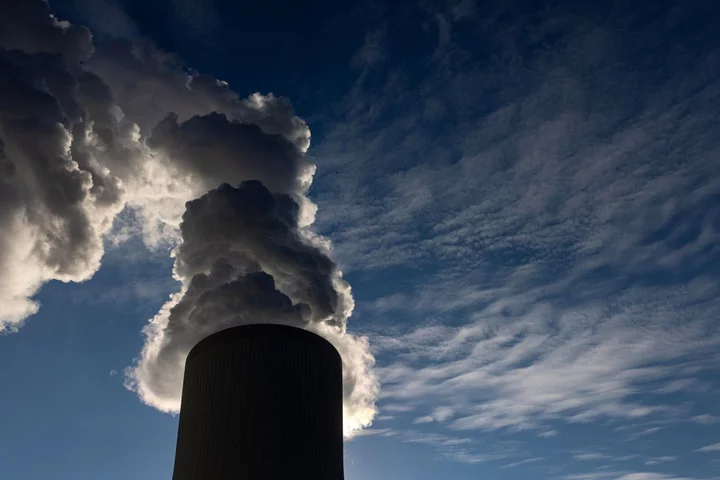
Zimbabwe Exchange to List Carbon Credits as State Upends Trade
Zimbabwe’s Victoria Falls Stock Exchange plans to set up trading in carbon credits by September, seeking to capitalize
2023-05-24 22:21

South Africa Weighs Extending Lives of Larger Coal Power Plants
South Africa is considering extending the lives of some of its biggest coal-fired power plants as the government
2023-05-24 17:17
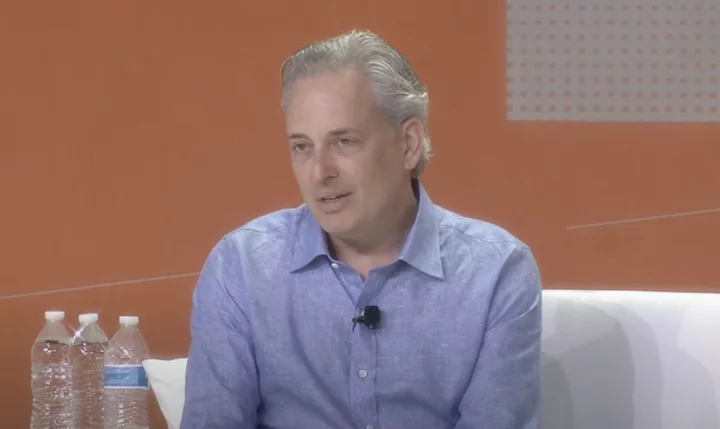
David Sacks: The controversial entrepreneur hosting Ron DeSantis 2024 event with Elon Musk
David Sacks, an entrepreneur and venture capitalist, will host Florida Governor Ron DeSantis and Tesla CEO Elon Musk in an audio chat on Twitter Spaces on Wednesday (24 May) where Mr DeSantis is expected to announce his campaign for 2024 president. Mr Sacks, 50, is a longtime friend of Mr Musk and supporter of Mr DeSantis. Though Mr Sacks’ name is not as prominent as other tech-industry giants, the entrepreneur has a long history of leading and investing in major companies like PayPal, Yammer, Facebook, Airbnb and more. In more recent years, Mr Sacks has become a major donor to political campaigns for individual Republicans like JD Vance and Mr DeSantis. What experience does Mr Sacks have? Mr Sacks – who was born in Cape Town, South Africa in 1972 and moved to Tennessee with his family as a child – was the Chief Operations Officer (COO) and head of product for PayPal from 1999 until 2002. He has been dubbed part of the “Paypal Mafia”, a group of former PayPal employees who went on to have successful tech companies- like Mr Musk. In 2008, he founded Yammer which became one of the fastest-growing software-as-a-service companies to exist. In 2012, Yammer was acquired by Microsft for $1.2 bn. Mr Sacks co-founded the venture capital firm Craft Ventures in 2017, where he remains a partner. He also has the podcast All-In alongside fellow entrepreneurs Chamath Palihapitiya, Jason Calacanis and David Friedberg. Last year, Mr Sacks was widely reported to be helping out his longtime friend, Mr Musk, behind-the-scenes when his fellow South African-born friend acquired Twitter. What does Mr Sacks believe in? Like Mr Musk, Mr Sacks says he is a proponent of free speech. In a blog post on Medium in 2021, Mr Sacks criticised big tech social media platforms for permanently banning politicians. His belief in free-speech was echoed more recently in an interview with conservative personality Benny Johnson. Mr Sacks accused the media of not allowing anti-vaccine activists and Democratic presidential candidate Robert F Kennedy Jr to speak freely and questioned critics’ justification of saying Mr Kennedy was spreading misinformation. The entrepreneur also expressed support for Tucker Carlson after he was unexpectedly fired from Fox News. Mr Sacks has also been an outspoken critic of US policy towards Ukraine following the Russian invasion that began in February 2022. In a piece for The American Conservative last year, Mr Sacks proposed a peaceful end to the war which included holding referendums on the future of Donbas and Crimea, both of which were illegally occupied by Russian forces in 2014. On Twitter, Mr Sacks is vocal in criticising the US for its involvement in the Ukraine-Russia conflict and has repeatedly clashed with critics of Vladimir Putin, including former US ambassador to Russia Michael McFaul. In October Mr Musk retweeted an article Mr Sacks wrote for Newsweek in which he argued that continued military support for Ukraine could lead to “Woke War III”. The article itself was a response to the backlash Mr Musk received over a Twitter poll suggesting a peace deal which would strongly favour Russian interests. In his Newsweek article, Mr Sacks wrote: “There will be no peaceful resolution to this conflict that America doesn’t at least have a hand in negotiating, and we should be leading the effort. Instead, we’ve been deferring to the Ukrainians and their maximalist demands, upping the sanctions on Russia as Putin ups his rhetoric against the West.” While he has been criticised for his outspoken views despite lacking a foreign policy background, he has argued that his lack of expertise is actually an advantage: “Not being a member of the MIC [military industrial complex] is clearly an advantage in understanding the conflict.” What political candidates has Mr Sacks supported? Since the 1990s, Mr Sacks has supported both Republican and Democratic candidates according to OpenSecrets. His largest donations have gone toward the PAC supporting GOP Ohio Senator JD Vance, the conservative Purple Good Government PAC, Democratic California Governor Gavin Newsom and the Republican National Committee. Over the last two years, Mr Sacks has expressed vocal support for Mr DeSantis on Fox News and Twitter as well as donated to his political campaign. Read More Ron DeSantis to launch 2024 presidential bid on Twitter with Elon Musk Can the chaos from Silicon Valley Bank's fall be contained? Casey DeSantis gives cheeky response to reports husband is launching 2024 campaign
2023-05-24 07:23
